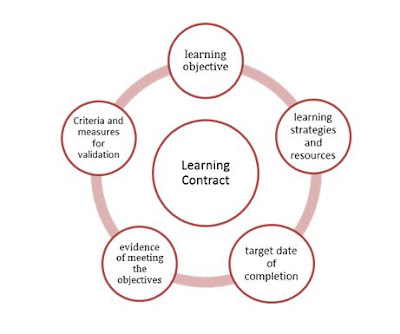Learning Contracts & Professional Development Plans: What Do They Mean?
In order to understand the differences between a learning contract and a professional development plan, one must first gain knowledge of each word’s definition. According to Webster’s Dictionary each word means the following…
learning = knowledge or skill acquired by instruction or study
contract = a binding agreement between two or more persons or parties
Therefore, learning + contract = a binding agreement between two or more persons or parties in which at least one of the individual’s acquire knowledge or skills through instruction or study.
What does this mean in layman’s terms? Basically, it means an individual operates in a self-directed manner to learn a certain topic of interest by designing an agreement with at least one additional person. The additional person can be a teacher, mentor, or supervisor. The learning contract designs parameters relating to objectives, times lines, and validation that the objectives have been met. Once the learner accomplishments the designated objectives, then he/she can extend their learning into another area of interest.
By putting a picture into words, the learning contract process would look like this…
When defining the words professional, development, and plan, Webster’s states the following…
professional = characterized by or conforming to the technical or ethical standards of a profession
development = larger or more advanced
plan = a method for achieving an end
Put all of these words together in which professional + development + plan = a written document for a professional to create more advanced skills by achieving an ending point.
An illustration defining a professional development plan would look like the following...
Notice there is an ending point. The individual may decide to expand his/her knowledge in a particular interest; however, they would need to go back to the starting line.
The learning contract and professional development plan provide the individual an opportunity to develop goals and objectives as well as set parameters in the manner these objectives will be met. However, the learning contract caters to the self-directed learner and provides an opportunity to examine various aspects of his/her life, such as areas of professional, personal, and/or spiritual growth. On the other hand, a professional development plan only allows the individual to focus on his/her growth within their career. It does not take into consideration the impact an individual’s personal and/or spiritual life. The missing links can directly intersect one’s professional life. After all, a holistic approach should be taken in order for success to be achieved.
A Venn diagram best illustrates the similarities and differences between a learning contract and a professional development plan.
As a result of understanding the differences between a learning contract and a
professional development plan, one should view a learning contract as an investment within the parameters of the information he/she would like expand upon within their life. A professional is able to work closely with a teacher, mentor, or supervisor and follow a cyclical pattern in establishing new objectives once the initial objectives have been met through the validation process. Therefore, it can be a never-ending experience to becoming a self-directed learner!


